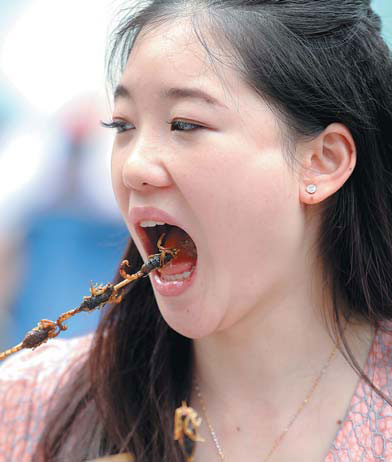Nation not ready for insect diet, expert warns
Updated: 2013-05-17 08:30
By Yang Yao (China Daily)
|
||||||||
|
Duan Ying, 24, samples fried scorpion in Wangfujing, Beijing. Wang Jing / China Daily |
An expert says China is not ready for mass consumption of insects, which the UN Food and Agricultural Organization claims could protect the environment and help solve the food crisis.
The solution to the global problem comes in a research report titled Edible Insects: Future Prospects for Food and Feed Security, issued by the organization.
The publication also covers other creatures eaten by humans, including spiders and scorpions.
High in protein, vitamins, fiber and mineral content, insects will become a new dietary trend, the report states.
However, Gao Xiwu, an entomologist at Chinese Agricultural University who specializes in the economic value of insects, said China, one of the largest insect-consuming countries, is not ready for the mass consumption of insects.
"A clear and comprehensive food safety standard is needed to pave the way for promoting insects as food," he said.
Some insects carry toxins, pesticide residue and bacteria, and the method of preparing them as food is not sufficient to prevent potential risks, Gao said.
On Beijing's Wangfujing food street, scorpions and silkworm chrysalis are sold after being fried or roasted. Three fried scorpions on a stick are sold for 25 yuan ($4).
The manager of the food street, who would only give his surname, Du, said scorpions can be found in any traditional Chinese medicine.
"If these ingredients can be used in medicine, there is no need to worry about safety when eating them," he said.
Guo Huanchao, a manager at the Yunteng restaurant in Beijing, where fried locust, honey bee pupae and bamboo worms are served, said there are no set guidelines on preparing insects as food.
"It's hygienic as long as they are heated properly, either boiled or fried," he said, adding that this is how people in Yunnan province prepare them.
Guo said supplies mainly come from Yunnan, where edible insects are harvested in the wild or domestically.
"The frozen insects are shipped here once a week, five kilograms at a time," he said. "Very few enterprises rear large quantities of insects."
Qinyuan county in Zibo, Shandong province, is home to the largest insect breeding base in the country. With about 200 insect farmers, it can produce 400 metric tons a year.
However, Liu Long, president of the Edible Insects Breeding Association, said investors are not rushing to enter the industry even though it generates cash and jobs.
Attempts to include insects in food management began in 1996 when what are now the China Food and Drug Administration and National Health and Family Planning Commission approved more than 30 health products containing ants. But since then, no progress has been made.
"The processing of insects should follow the same health and sanitation regulations as any other traditional food, to ensure food safety," Gao said. "The mistakes made in the livestock industry should serve as a lesson for insect farmers."
Influencing the public as well as policymakers and investors in the food sector needs more validated scientific research on the potential of insects as food, Gao said.
"Further documentation is also needed on the nutritional value of insects to more efficiently promote them as healthy food," he added.
The Kunming Institute of Zoology in Yunnan province is the nation's major research institute in this field. However, a spokeswoman said there has been no progress in scientific results on edible insects for years.
yangyao@chinadaily.com.cn
(China Daily 05/17/2013 page1)

 Michelle lays roses at site along Berlin Wall
Michelle lays roses at site along Berlin Wall
 Historic space lecture in Tiangong-1 commences
Historic space lecture in Tiangong-1 commences
 'Sopranos' Star James Gandolfini dead at 51
'Sopranos' Star James Gandolfini dead at 51
 UN: Number of refugees hits 18-year high
UN: Number of refugees hits 18-year high
 Slide: Jet exercises from aircraft carrier
Slide: Jet exercises from aircraft carrier
 Talks establish fishery hotline
Talks establish fishery hotline
 Foreign buyers eye Chinese drones
Foreign buyers eye Chinese drones
 UN chief hails China's peacekeepers
UN chief hails China's peacekeepers
Most Viewed
Editor's Picks

|

|

|

|

|

|
Today's Top News
Shenzhou X astronaut gives lecture today
US told to reassess duties on Chinese paper
Chinese seek greater share of satellite market
Russia rejects Obama's nuke cut proposal
US immigration bill sees Senate breakthrough
Brazilian cities revoke fare hikes
Moody's warns on China's local govt debt
Air quality in major cities drops in May
US Weekly

|

|








